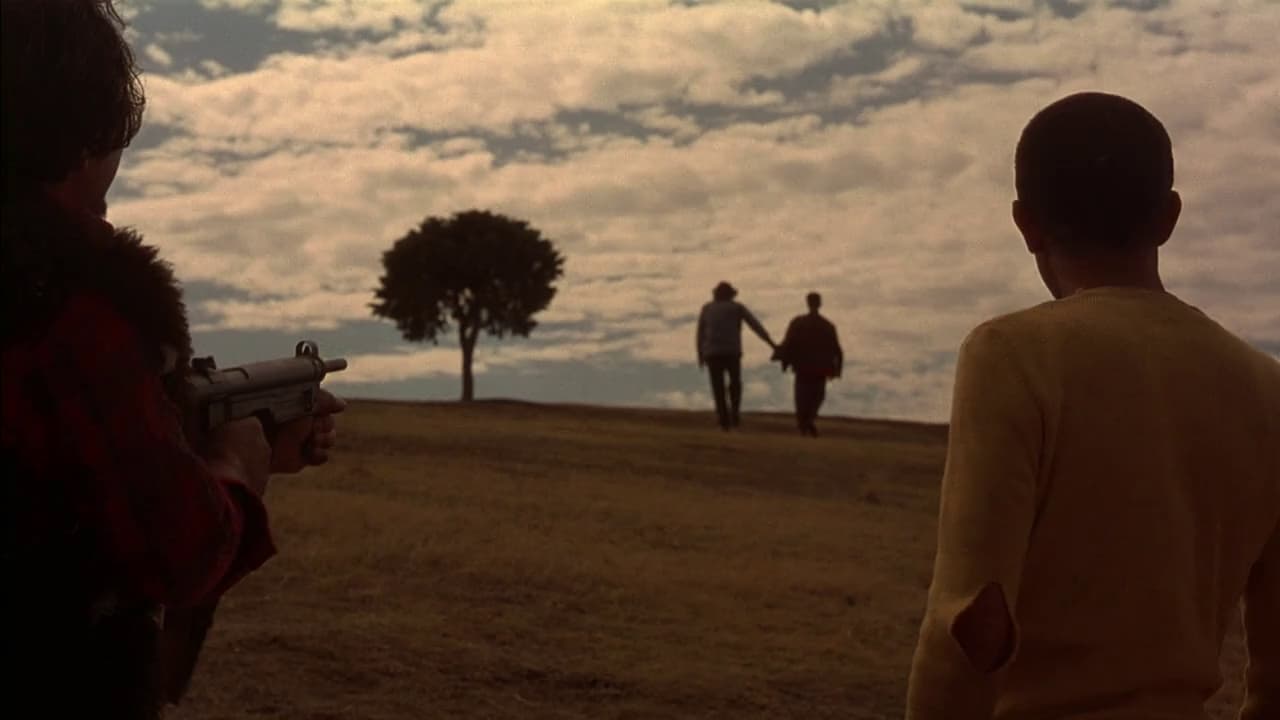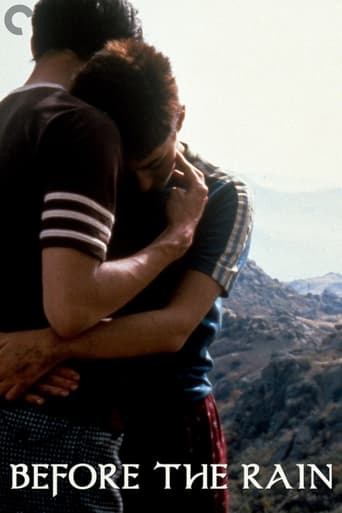Colibel
Terrible acting, screenplay and direction.
PiraBit
if their story seems completely bonkers, almost like a feverish work of fiction, you ain't heard nothing yet.
Geraldine
The story, direction, characters, and writing/dialogue is akin to taking a tranquilizer shot to the neck, but everything else was so well done.
Darin
One of the film's great tricks is that, for a time, you think it will go down a rabbit hole of unrealistic glorification.
perica-43151
This is a powerful movie about the circle of conflict, coming from the authentic Balkan region that is troubled by these issues for ages. It gives you the perspective on these themes in a great, artistic and sincere way. Highly recommended.
ecmelton-186-105049
Before the Rain is a film composed of three loosely interconnected episodes Words, Faces, and Pictures. All of these segments are dealing with the influence of the Bosnian War in Macedonia, and the unintended consequences war, especially racially motivated war, can have on people's lives. The first segment called Words takes place at a picturesque Macedonian monastery located atop a mountain.The cinematography is beautiful. There are lush green gardens, mountain ranges, and a vibrant sky with oversized and exaggerated features. Within the monastery itself there are lingering shots on pre- Renaissance paintings and the architecture of the compound. Words is undoubtedly the most visually stimulating of the episodes. The second segment, Faces, is odd when compared to the first and third. It doesn't take place in Macedonia, instead it is set in London and is entirely in English whereas the other segments are in Macedonian or Albanian with subtitles. It is also the weakest episode in the movie. The story is less interesting and maybe even a little boring, as it deals with a woman coping with an inconvenient pregnancy and her love for the man she has been cheating on her husband with, which is much less compelling than the creeping threat of bigotry and war that the rest of the movie focuses on. The cinematography is not very good is this section either; instead of the vibrant Macedonian countryside, Faces just takes place in a dirty city and lacks any of the interesting or stylized visuals that can be found in Words or Pictures. It also has the weakest links to the other segments. The only connection to the first segment are some photos of Kiril and Zamira that were taken after Zamira's death. These are only briefly seen and have no impact on the story. Because the link is so flimsy it would be easy to forget about these photographs or just discount them. If a person did that they might think that the first segment actually happened last and the rest of the film was just a flashback. The filmmakers clearly wanted a more complicated explanation to the films continuity, so by making it so easy to ignore certain details, they've undermined their own ideas. The only interesting detail is that Katrin Cartildge, who plays the protagonist in this episode would play a nearly identical journalist character who is also caught up in the Bosnian conflict when she appeared in No Man's Land seven years later. The third and final segment, Pictures, is the strongest of the three. It is the only segment that successfully contains story elements from the other two episodes, bringing in Aleksandar who was introduced in the Faces as the protagonist and giving the backstory of Zamira before the events of Words. It is the section of the film that creates the most tension and has the most emotional resonance. This segment also features several apparent homages to classic American Westerns. The scene where Aleksandar is riding a bicycle while whistling is reminiscent of the bicycle scene with Paul Newman from Butch Cassidy and the Sundance Kid, and when Aleksander is going to his cousin's barn to help birth the lambs he is framed in the darkened doorway almost identically to the way John Wayne is framed in The Searchers. When Aleksandar first walks up to his old house the camera is at a low angle focusing on his destroyed house and roughly constructed fence as Aleksandar walks into frame from the left with the sun setting in the background. There are similar shots in Clementine and the Grapes of Wrath, both John Ford movies as well. There is even a moment where Aleksander gives a Zippo lighter to the father of former girlfriend, noting that they are often used in American movies. This reveals that the director has seen enough American films to know the minute detail of what kind of lighters are often used, so it is reasonable to assume that he would intentionally include the other references because he is a fan of the movies they came from. Aside from the individual stories the movie's big selling point is the way it plays with the ideas of time and continuity. In the second segment there is graffiti on a London wall that that says, "Time Never Dies, The Circle is not Round." This is also the tagline of the movie, and sums up the nonlinear approach the movie takes. Before the Rain came out in 1994 the same year as what is likely the most famous example of nonlinear storytelling, Pulp Fiction, but Pulp Fiction's approach is much different than this movie. While the scenes and story segments are out of order in Pulp Fiction they could be edited into a linear movie without any real contradictions. Before the Rain wants to emphasize these contradictions and make a story that could never be told in a strictly linear manner. The point of doing this seems to be to make a statement about the vicious cycle of war. How things mindlessly repeat over and over for no reason, accomplishing nothing. Particularly it deals with the way these ideas pertains to the Bosnian War. The film characterizes the war as being meaningless and motivated by prejudice. It's interesting to note that of the three major deaths in the movie, none of the three killed were soldiers, none were actually involved in the conflict, and in the case of Zamira and Aleksandar they are killed by their own family members. At no point in the movie does anyone successfully kill their "enemies." They only succeed in killing bystanders or the people they would claim to be fighting to protect. This seems to be the core idea of the movie.
kalala
I cannot praise this film highly enough. It is one of my all time favorites.This is an exquisite, haunting film that does not get shown enough. The three interlocking parts of the story slant time and recast different characters in parallel tales that form a wreath, not a sequence or circle. Each story follows a similar arc and includes similar elements: a hidden impregnation; an agonizing choice that reaches out to one that has already passed out of reach; an unexpected victim of violence; and the tragic back story of attack and retribution that dates back at least a thousand years to a late Byzantine reprisal. The elements map to the Christ story as if it had been compressed in a black hole, the virgin birth and sacrificial death compacted together and exploding out of a dazzling collage of violently mindless brutality and mindful attention--to prayer, to craft, to shepherdry. Where is the viewer? A tragedy that is so alive in current events calls to action. If we are mute witnesses, then the story will reach a point where we must testify to the tragedy(so the photographer's stills tell us). But what words could have stopped what happened? If we stand by and are glad that the story is not ours we may yet find ourselves in the story. It doesn't matter if the face is Balkan or Palestinian--ejecting the combatants fails as policy. In the end and ending, reentering the picture as participant, not witness, repossessing the ruins of home and taking responsibility for the fruit of love, means giving up personal immortality (the European illusion of celebrity) in exchange for a blood-soaked collective eternity.
bryonpav
With a slow pace, weak plot, terrible dialogue and a Donnie Darko-timeline, this film has nothing to offer Americans. It is simply a collaboration of mediocre cinematography combined with fragments of a plot only suited for foreign-filmers who don't expect any character development, decent acting, "good" directing, or even a freaking point. It's a silent film, but with words, and it bored the crap out of me. First of all, I was confused. I have never been so frustrated with a movie; ironically, I expect this to be one of those films that you're supposed to allow it to affect you without worrying about it, but ouch what a headache...Okay... I'm very picky about my movies and usually blow off most "Hollywood" movies right away, unless I see that people like it or have some special reason to go see it, but even then I am often disappointed. Independent cinema is where it's at... but to be completely honest, most foreign films drive me mad. So many of them will spend 10-20 minutes just letting something "sink in"... that means no dialogue and often no score for an unfairly long amount of time! Dialogue is the key to successful filming, that's where the screenwriters should come in, and Manchevski is clueless. The dialogue was worthy of only Keanu Reeves and there was far too little of it to make a whole movie, so instead they showed us the same shots, and the same angles over and over again, against the sound of… silence, expecting dramatic effect. And then… oh no! A random guy pops out with a gun and destroys any hope the movie had in being any good. I must admit I was hopeful when the movie started, I watched closely, listened closely, thought openly, and was ultimately crushed by its inability to give me what I paid for. It sucked butt.

